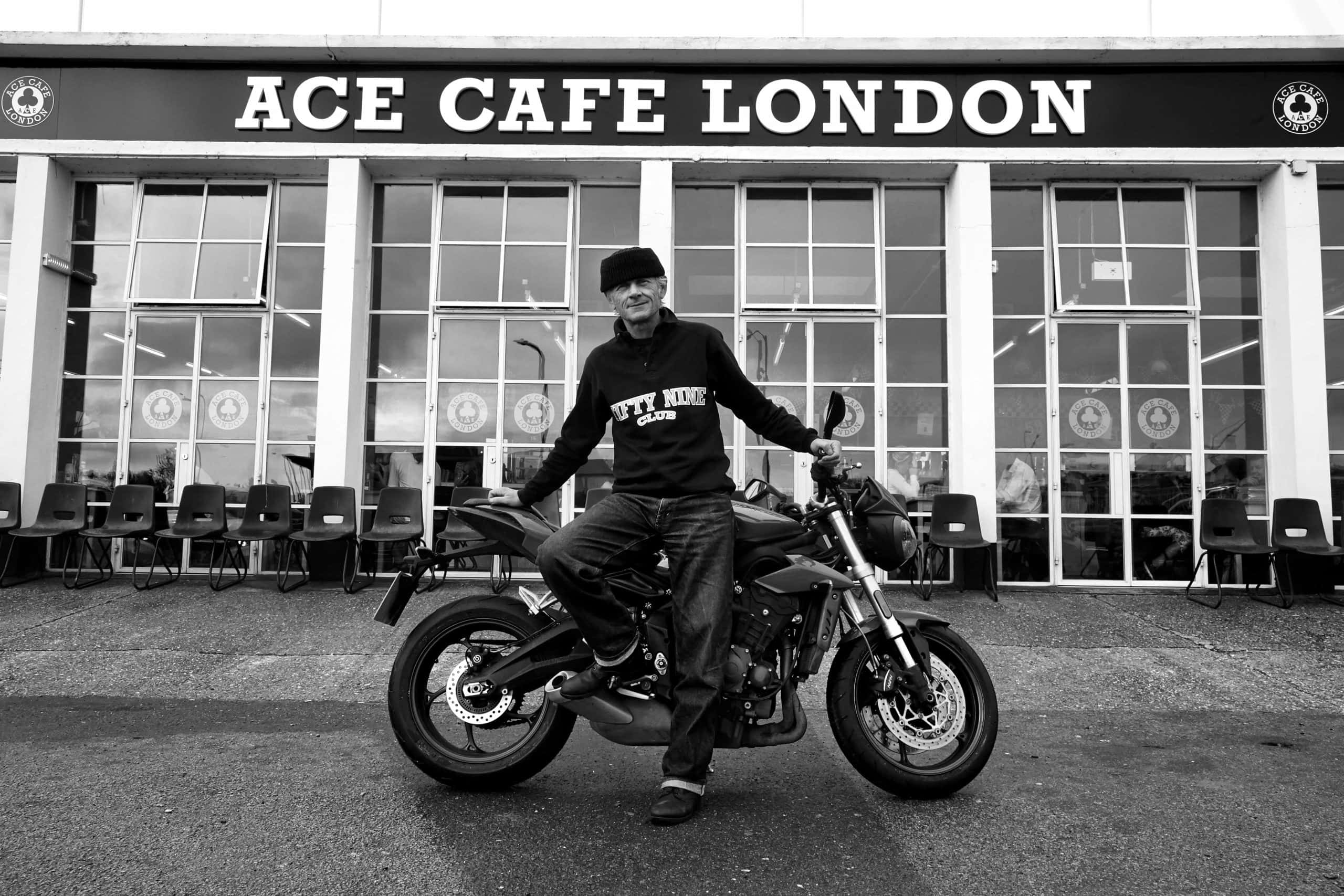
There he is, perched on a chair, basking in the late-September sunshine, surrounded by youngsters. Mark Wilsmore – lifelong biker, restorer of London’s Ace Cafe and self-confessed adrenalin junkie – catches me walking towards him. He doesn’t move. He doesn’t need to.
“You’ve just caught me having my tea and fag – I need this when I come in, just to settle down.”
It strikes me immediately how soothing and precise he is when he speaks, which adds to his aura – the one that has drawn and grounded the teenagers sitting on chairs nearby. Wilsmore is just below the age of being either the granddad you wish you had or the one you know you do (I’m 20).
We go inside. He offers me tea before asking one of his bar staff to make one. He can afford to be bossy, which he negates with that slow, purposeful voice: he is the boss. Not merely the boss though (or, Managing Director, for its official title), he’s a saviour who restored the Ace Cafe to a former glory that it too can bask in today.
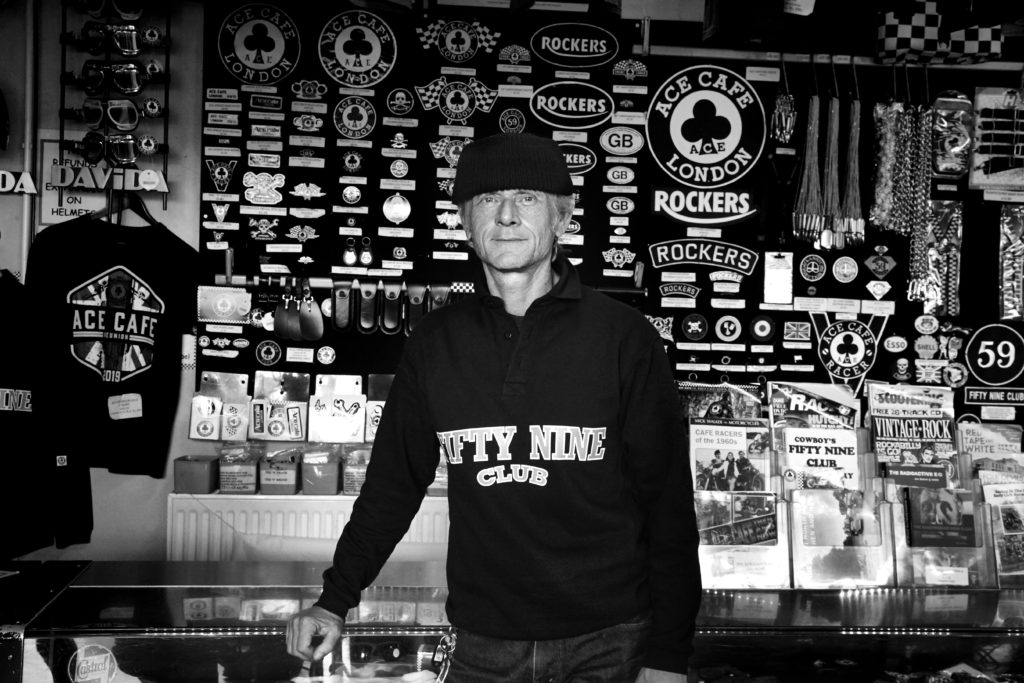
Mark Wilsmore, architect and owner of the restored Ace Cafe in London
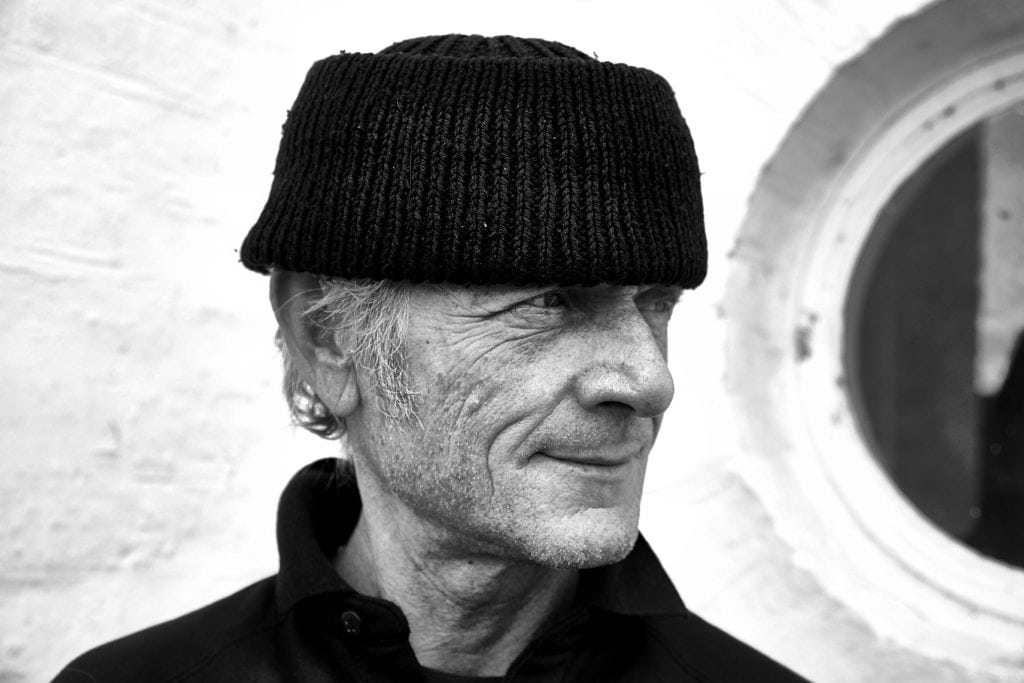
“1993 was the bright idea, ’94 was when we had the reunion. It did seem that something had to be done, with friends and what-not going ‘How can we help?’ Although there were plenty of places for bikers, there was nowhere you could think of that was home. Looking back, it all seems relatively easy but at the time it was a whole new adventure.”
Mark’s adventure is the most recent chapter in history that, like a biker weaving a way through London, has faced many twists and turns. First established in 1938, the Ace Cafe sits on the North Circular Road and naturally became both a hotspot and a pitstop for the biker community driving eastwards into London. Two years later, the site was decimated in an air raid before being rebuilt in 1949, after which it enjoyed two decades of peace and prosperity. Mark explains to me the wider events that led to Ace’s closure in 1969 in that slow, melodic, almost grandfatherly manner.
READ MORE: London’s heritage caffs | A greasy spoon voyage
“By and large, the motorcycle demographic is known to be a shrinking and ageing demographic – you know, motorcycle sales in the UK rose very quickly to a peak in 1959. Those driving these sales were youngsters at the time – rockers –since then, they’ve only been on a downward slope. There have been blips on the way down, but that’s been the general direction of travel.
“In 1959, a new car came out that entirely changed the game – and that car was called…” he pauses as if to suggest I should know the answer “,…the Mini. And a Mini was cheaper than the new revolutionary bike: the Triumph T120 Bonneville, which had twin cylinders, each of which had a carburettor.
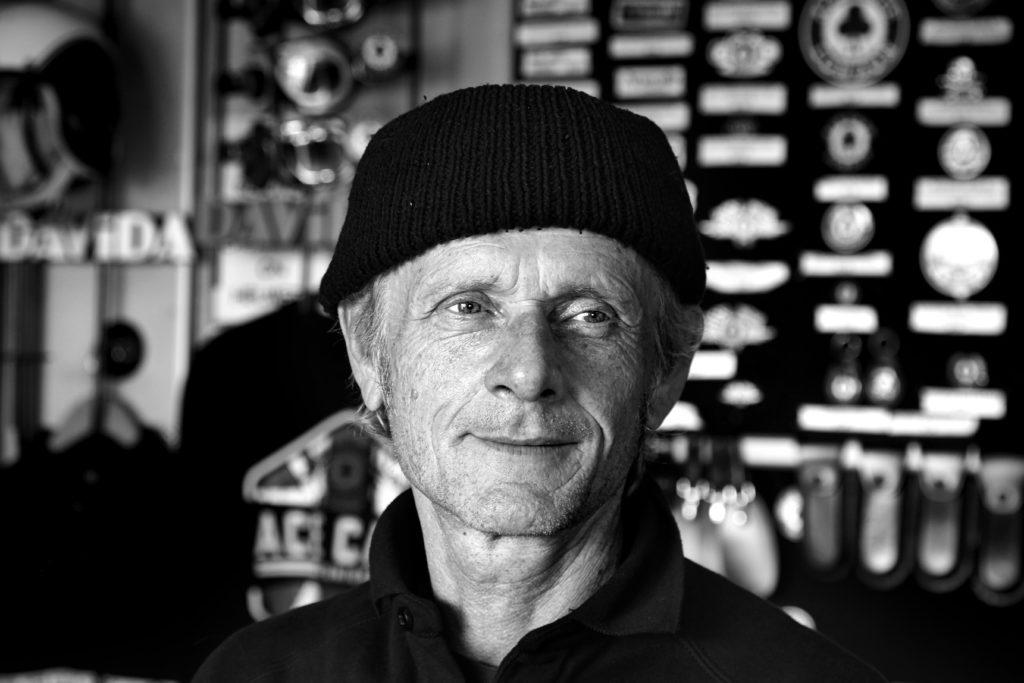
“And of course you move through that next decade – the sixties – and other manufacturers bring out their cars that are competitive with Minis, and you wind up to a circumstance in ’69 where something like two-thirds of households in the UK have a car.” This ascent of the car, and descent of the motorbike, inevitably led to a change in the Ace Cafe’s fortunes, forcing it to shut up shop in 1969.
But Mark, ever since veering towards becoming a rocker in his early teens, has never switched lanes from the bike to the car. “In my case,” he explains, “what I’ve enjoyed is summed up in the term ‘speed thrills’. And that, certainly, in my youth, was all about motorbikes.
“You can go a lot faster on motorbikes than you can on a scooter,” he adds, his dislike for mods, who typically drove scooters, still evident, “and you look faster on a motorbike, sound faster on a motorbike.
“Riding is addictive, although as you get older it does seem that perhaps you don’t need as much – but you do still need a top-up every now and again. Whereas, in the years of youth, I would venture to say, it was about getting an almighty fix to really feel it, to get that rush.”
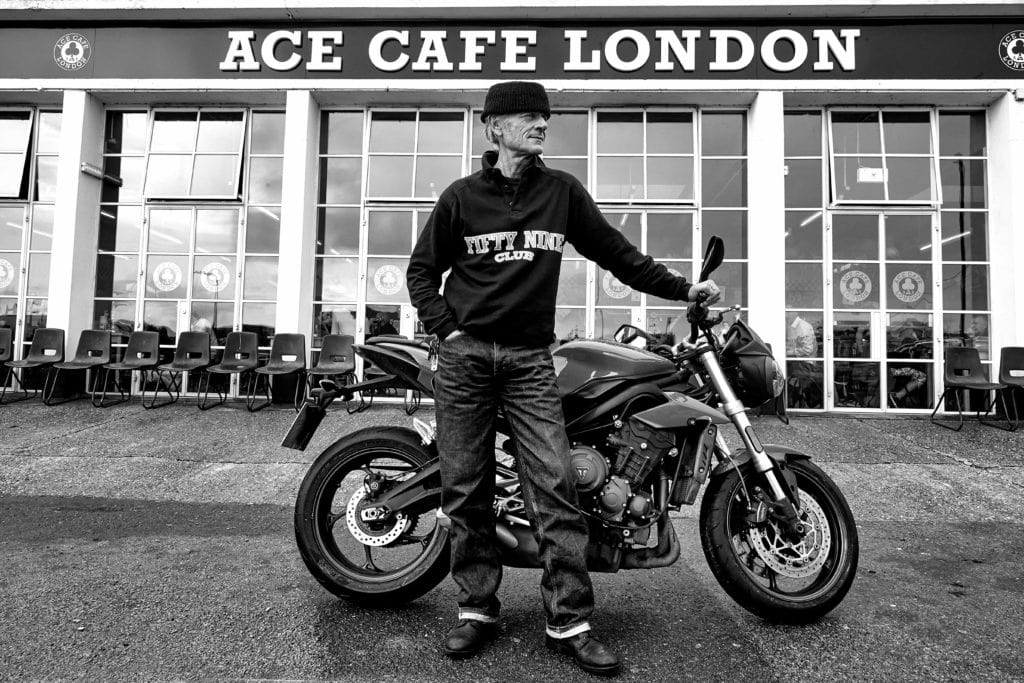
I ask him about the inevitable dangers of his lifetime pursuit, which, like any drug, offers the thrill of near death with every encounter.
“I’ve had lots of crashes, lots of crashes. Remarkably, I’m still here to tell the tale – so I can thank and bear testament to the NHS. My brother, some years ago, added this up, and he reckons there’s been about five years I’ve spent in hospital through crashes. I’ve managed to avoid a lot in the last few years, but that’s one of the hazards, you know, part of the buzz of it.”
Mark, it seems, is a survivor. The manner of his voice now makes perfect sense: it’s slow because he’s chased speed almost his entire life, deliberate because he’s aware of the preciousness of every utterance. In short, his lifelong love has made him aware of how short life is.
“I’m very aware that many people have said – and I entirely agree – that when you court death and you skirt with it and near it and see it, that is when you start to value life. Until that moment, you can’t quite comprehend it, and I think that is imbued in motorcycling, this feeling, this sensation that again draws you further into it.
“Once you’ve had a taste of that, you are enthralled; you enjoy, if not rejoice in, the fact that “I’m alive, look at me, I can do wheelies” – yes, motorcycling is a celebration of life, absolutely.”
This celebratory mentality was the impetus for reopening the Ace Cafe after an older man told Mark of the original Ace Café’s closure: “He said to me in 1993 that the following year would mark 25 years since the original’s closure. I realised that the next year – ’94 – would be 25 years since it was closed, and that was when the light bulb went on: reunion.
READ MORE: Ezy Ryders | The black bikers of NYC
“So, having put that to bed in my mind’s eye, it was then the realisation that that reunion would be the key to seeing the place reopen. I had no idea at that particular moment as to how on earth that could be done, but in essence the support of a very diverse number of people meant that it had to be done, which then became the mission, as it were – the fulfilment of which I guess was in 2001, when the place fully reopened.”
And, thanks to Mark, the Ace hasn’t just been reborn and thriving. Recognised as an icon of, and among, the biker community, it’s raced across to global shores. Between 2011 and 2017, an Ace Cafe has spawned in Lahti (Finland), Luzerne (Switzerland), Beijing, Barcelona and Orlando, and, as Mark indicates, continues to seek expansion.
It’s little wonder then that we’re interrupted by one of Mark’s friends and fans just as I ask him about his hero status following the reunion.
“It was a terrific moment, and some people do say “I’m so proud”, all sorts of very generous and flattering remarks, but I just feel a real privilege to be part of something. And the great joy of working…”
The friend leans over from the other end of the table, pausing his demolishment of a full English breakfast to show me a picture from his phone. It’s a mural. It’s of Mark’s face.
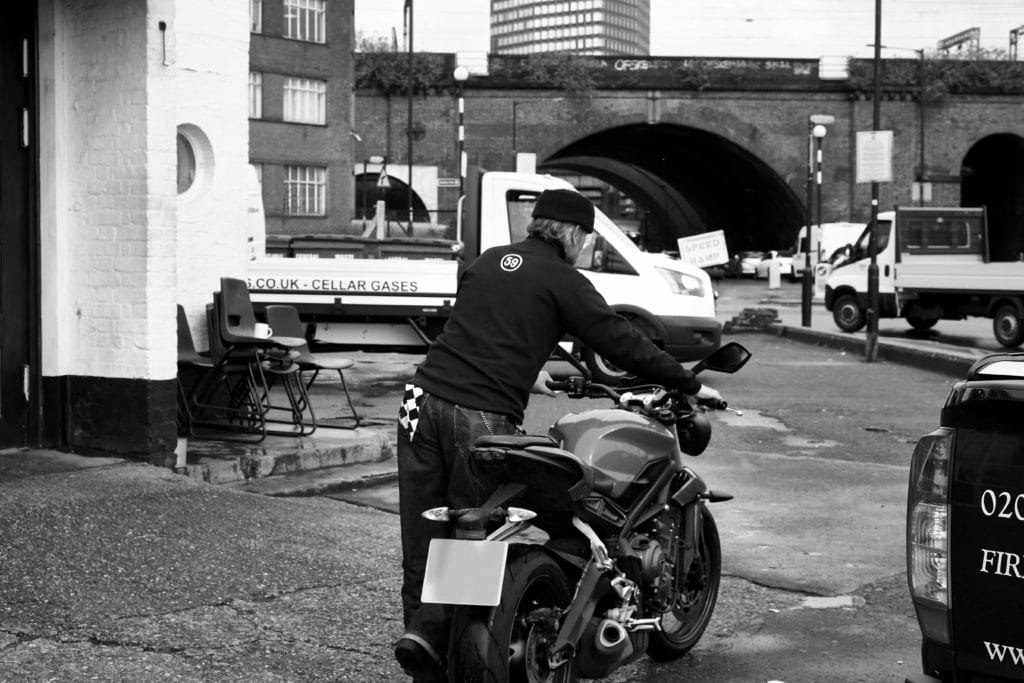
“That was done in America,” he says.
Mark pauses, marking his intent not to appear big-headed, then nods to his chum.
“The buzz I get,” Mark continues, “is seeing people enjoy each other’s company and enjoy themselves, and that is really something special – I love bikes, I love cars, I love the engines and the noise and all the drama that’s associated with it. But as I’ve gotten older, I’ve come to realise the biggest buzz I get is seeing people enjoy themselves, and then seeing lads, typically of your generation, and hoping they get home safely.”
Mark has seen generations come and go, time and again, in different forms. For most of his life, he’s seen this through the lens of being in a group of his own. But now he imparts his wisdom onto me, not from the tribal aspect of being a rocker but from the thoughtful perspective of a concerned gentleman.
READ MORE: The true story behind London’s worst-rated restaurant
“People want a sense of belonging, and when you look at the rockers and the mods, it’s seeking to be part of something. And that grew enormously through the sixties, seventies, and eighties, primarily through football, but that’s all been pushed aside now.
“We’ve now got street gangs just as we had back in the fifties, fighting it out for who’s top dog, and all the blood that gets spilled. It seems to be repeating exactly now as it was in the fifties. The contraband has changed but the dynamics haven’t.”
And on that wistful, grandfather-like note, it was time for me to leave and get home safely.


